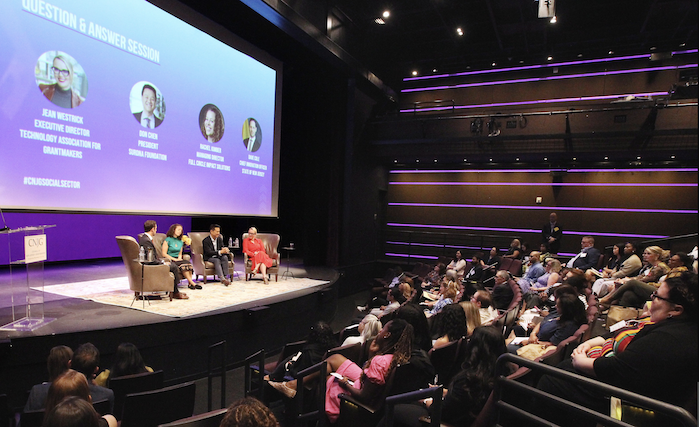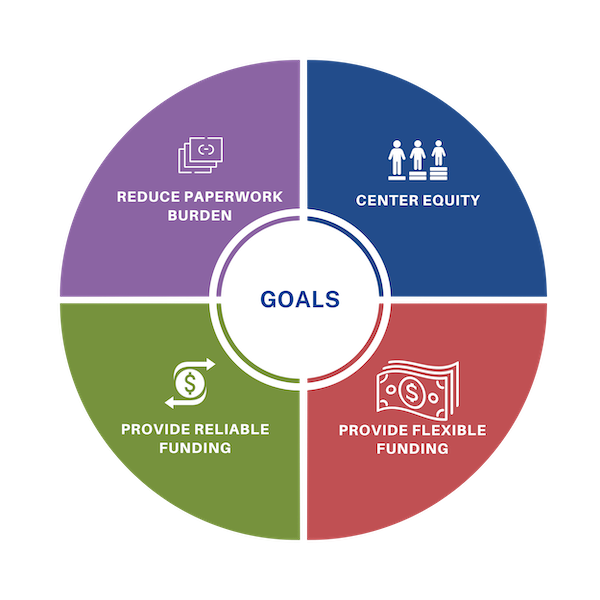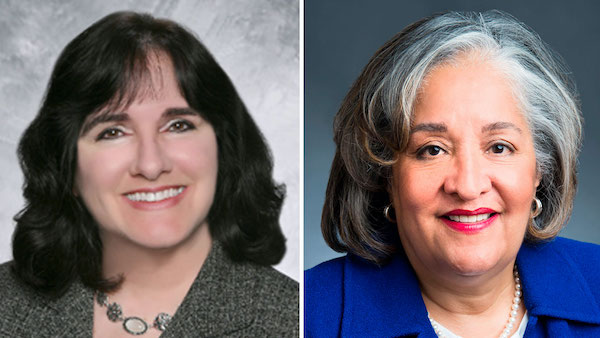Site Search
- resource provided by the Forum Network Knowledgebase.
Search Tip: Search with " " to find exact matches.
Empowering the Future: Harnessing AI and Data for Philanthropic Social Impact
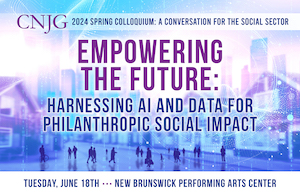
Date: Tuesday, June 18
Time: 9:30 a.m. to 3:30 p.m.
Location
New Brunswick Performing Arts Center
Arthur Laurents Theater
11 Livingston Ave, New Brunswick, NJ 08901
Directions and Parking
On Tuesday, June 18, 2024, the Council of New Jersey Grantmakers held the Spring Colloquium – A Conversation on the Social Sector at the New Brunswick Performing Arts center. This year, we explored the impact of AI and data on philanthropy and the nonprofit sector. Our panel discussion will brought together multiple perspectives to explore how AI can enhance problem-solving without losing human connections, how it affects equity, and how philanthropy has engaged with AI for funding initiatives.
The Technology Association of Grantmakers’ new Executive Director, Jean Westrick, moderated our esteemed panel that included Don Chen, President, Surdna Foundation; Rachel Kimber, Full Circle Solutions; and Dave Cole, State pf New Jersey’s Chief Innovation Officer.
After the panel, Jean Westrick, TAG, facilitated an afternoon session on an AI Framework for Philanthropy. Additionally, the Community Resource Exchange presented an afternoon session on an AI Guide for Nonprofits facilitated by their CEO, Tiloma Jayasinghe, CEO and Jared Carroll, Senior Consultant.
CNJG’s spring colloquium brought together New Jersey grantmakers and nonprofits to connect with each other, Increase their knowledge, learn best practices, find opportunities for collaboration, and to be introduced to new ideas.
Conference Photos
This weekly conference call series welcomed New Jersey-based grantmakers along with national funders and provided an opportunity for grantmakers to hear from a wide range of experts in the field of disaster philanthropy. This series started on September 9, 2013 and concluded on November 4, 2013. The written summaries of each recording are listed below.
Home ownership remains a central pillar to the American dream. For most Americans, home equity encompasses the lion’s share of their wealth. Yet, housing is becoming increasingly inaccessible and out of reach. Median sales prices across the country have outpaced income growth. Demand for housing far outweighs supply. Costs are out of range for many. Contemporary mortgage markets still exclude more than half of Black American households from homeownership. The importance of homeownership in building wealth coupled with the oppressive legacy of racial exclusion point to the need for systemic policy change.
Together, we will:
- Hear market-specific strategies to lower entry barriers and create more equity and affordability through housing policy
- Discuss the role of philanthropy to identify, support, and educate for housing affordability and equity
Speakers:
Christie Stewart, Chief Initiative Officer, Center for Housing Opportunity (CT)
Marcel Negret, Senior Planner, Regional Plan Association
Staci Berger, President and CEO of Housing & Community Development Network of New Jersey
Julian St. Patrick Clayton, Deputy Director of Policy and Research, Center for NYC Neighborhoods
Moderator:
Julian Pierce, Director, Economic Opportunity, Fairfield County’s Community Foundation
Cost: Free for CNJG Members and Non Member Grantmakers
Articles of Interest
Webinar recording
Renter Empowerment and Neighborhood Tools (RENT) for Health Equity
New York Neighbors Coalition
NYC Community Land Initiative and CLT Map
Reimagining Financial Resources for Affordable Housing Development in Fairfield County, CT in 2020
American Rescue Plan Act (ARPA) Fiscal Recovery Funds
Who Owns Newark? Rutgers-Newark Study Finds Troubling Rise in Corporate Buying of City Homes | Rutgers University-Newark
Connecticut Housing Accessibility and Affordability (urban.org)
Fairfield County Housing Accessibility and Affordability (urban.org)
The Fourth Regional Plan - The Fourth Regional Plan (fourthplan.org)
Housing Segregation is a Choice
Be My Neighbor: Untapped Housing Solutions: ADUs and Conversions
Be My Neighbor in Fairfield County: Untapped Housing Solutions: ADUs and Conversions

Deepening Philanthropic and Nonprofit Partnerships in New Jersey
Doing Good Better, a partnership of the Council for New Jersey Grantmakers and the New Jersey Center for Nonprofits, is a community of funders and nonprofits taking action against the power imbalances and racial inequities in philanthropy, nonprofits and government. Accessible, equitable, and mutually accountable relationships are primary and indisputable building blocks for a stronger society and thriving communities. Our goal is to shift the culture of the New Jersey philanthropic and nonprofit ecosystem by encouraging funders, nonprofits, and government to create shared power rooted in collaboration, mutual trust, and respect.
Doing Good Better Goals: A Framework for Change
The Doing Good Better Steering Committee encourages funders to focus on and advocate for four changes that can make an immediate difference in addressing power dynamics between nonprofits and funders and maximizing nonprofit impact.
Why now?
For many years, but particularly in the context of the COVID-19 pandemic, natural disasters, and the heightened outcry for racial equity and social justice, funders have been urged to embrace more flexibility and transparency in their grantmaking. Practices such as general operating support, simplified application and reporting procedures, multi-year funding and others have been shown to level the power imbalance, advance greater equity, strengthen partnerships between funders and their nonprofit partners, and thereby improve community impact.
Many grantmakers temporarily embraced flexible practices in the wake of Superstorm Sandy and during the height of the pandemic, and these structural changes empowered nonprofits to become more resilient and have a greater impact in their communities. But while some funders have retained the flexible practices, others have reinstated previous restrictions.
In New Jersey and across the country, there is a renewed urgency to NOT return to business as usual. It’s long past time.
Doing Good Better invites all of us to reflect on how power is distributed in our partnerships, learn from our peers, and make adjustments that position all community partners for transformative, equitable change in New Jersey.
How?
Guided and informed by 50+ advisors from New Jersey who represent a broad range of perspectives from nonprofits, philanthropy, and beyond, we are approaching this work through the lens of systems change – the recognition that transformative change can only occur after power structures have been addressed collectively. Specifically, Doing Good Better encourages funders to consider the power dynamics that underpin their policies, practices, and resource flows. To do this, we provide resources and a space for dialogue centered on changes in key practices and culture shifts.
Quick practice changes you can make now.
The road to systems change begins with changing practices that impede nonprofits’ pursuit of their missions, and implement practices that demonstrate respect for and trust in the expertise and experience of nonprofits and the communities they serve. Several key practices have consistently been shown to be particularly effective. Many of these have been requested by nonprofits for quite some time, and are reflected in the principles of Trust-Based Philanthropy and Community-Centric Fundraising, among others. Here are a few practice changes you can make now:
Type of Funding
● Give multiyear and unrestricted funding, especially for grantee partners with which you’ve had long term relationships.
Access to Funding
● Create alternative processes for organizations too small to submit audits to reduce barriers to obtaining grants.
● Set aside funding pools for BIPOC-led organizations that may not have access to traditional funding sources.
Simplifying the Process
● Simplify and streamline application and reporting processes.
● Eliminate annual requests for organizational information that does not change from year to year.
Learning
● Engage with the community through participatory grantmaking that aligns with the community’s goals.
● Open dialogues with nonprofits by soliciting and acting on feedback
How do we know?
We’ve asked the experts: nonprofits, foundations, and community members who are working directly in our community as well as peers from across the country who are eliminating power imbalances in their own communities.
● Feedback from over 50+ Advisors
● The Council of New Jersey Grantmakers survey
● The Center for New Jersey Nonprofit’s survey
● The Trust Based Philanthropy Project
● The Community-Centric Fundraising movement
● Thought leaders and advocates throughout the nonprofit community
● Case studies from across the US
This advocacy and civic engagement toolkit is designed for private foundations that want to educate and encourage their grantees about getting involved in civic and policy activities to increase organizational capacity and impact. While its primary focus is on the grantmaking activity of foundations, the toolkit also addresses rules and guidance for policy involvement by foundation officials acting on behalf of their foundations.
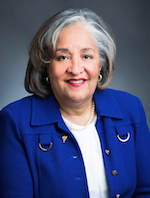 New Jersey’s largest philanthropic association has named longtime social sector leader Maria Vizcarrondo as its president.
New Jersey’s largest philanthropic association has named longtime social sector leader Maria Vizcarrondo as its president.
“Maria has been a trailblazer throughout her career,” said Council of New Jersey Grantmakers Board Chair William V. Engel. “We turn to her to help the state’s diverse and dedicated philanthropies to be even more effective in their quest to make this a better place.”
The Council of New Jersey Grantmakers is a nonprofit organization of over 130 members representing the philanthropic community in the state. Members include family, private, community, independent and corporate foundations, and corporate giving programs.
The Council exists to strengthen and promote effective philanthropy throughout New Jersey. CNJG’s programs and resources increase the impact of organized philanthropy’s support for adequate health care, quality education, a cleaner environment, community development, historical preservation, disaster response and relief, research, recreation, culture, and other areas crucial to the fabric of New Jersey's communities.
“I am very excited about joining the Council of New Jersey Grantmakers as its CEO and working with dynamic individuals — many of whom I have known and respected throughout my nonprofit career,” Ms. Vizcarrondo said. “Most importantly, I look forward to forging partnerships that will advance the Council’s social impact as a sector leader in New Jersey communities, the region, and nation.”
Ms. Vizcarrondo, who spent most of her career in northern New Jersey, comes to the Council from Cabrini University in Philadelphia, where she most recently was Director of Community Development and External Relations. She was inaugural Executive Director of the school’s Nerney Leadership Institute, launched in 2013.
Ms. Vizcarrondo brings more than 25 years of experience transforming service organizations and has served her communities as both an appointed and elected official.
In 2006, when he was first elected Mayor of Newark Cory Booker tapped Ms. Vizcarrondo to head Newark’s Health and Human Service Department, the largest of its kind in New Jersey. One of her first actions in that role was to develop a Children’s Bill of Rights to benchmark improvements in the lives of children and families throughout the city. Her accomplishments included securing state funding to establish Family Success Centers to provide neighborhood- based services, and launching a major citywide campaign to raise the immunization rates of Newark’s children.
Prior to her mayoral appointment, Ms. Vizcarrondo served as the first woman president and CEO of United Way of Essex and West Hudson. Her pioneer work in re-engineering the organization’s mission into community building was documented in the United Way Transformation Diaries. In the aftermath of the 9/11 attacks, Ms. Vizcarrondo led the New Jersey United Ways in a statewide coordination of services for affected families and managed the distribution of corporate funding for these efforts.
She was elected Essex County Surrogate in 1993 and served four years of a five-year term before leaving to join United Way.
Ms. Vizcarrondo has been listed among the “100 Most Influential People in New Jersey” and was a founding member of the New Jersey Institute for Social Justice.
###
Collaboration. Partnership. Alliance. Joint effort. Collective.
Whatever we call it - every one of us has been involved in a collaboration of some kind at some point in our lives. At the same time, both simple and complex, the definition of collaboration – the act of working together with other people or organizations to create or achieve something – means we collaborate nearly every day. To be human is to collaborate.
We’ll explore the constructs of more complex collaborations at the CNJG 2023 Annual Meeting & Holiday Gathering on December 14. Following the pre-meeting workshop, Tools for Funder Collaboration, the business meeting to elect new trustees, and the networking luncheon, the fireside chat, Sustainable, Effective, and Equitable Collaboration – A Conversation that Centers Community, will feature Nidhi Sahni, Partner and Head of US Advisory Group, Bridgespan, and Lucy Vandenberg, Executive Director, the Schumann Fund for New Jersey, to explore what makes a successful collaboration, and how collaboration strengthens the impact of funding initiatives across sectors.
The Annual Meeting is the place where the seeds of collaboration are often first sown. Consider the collaborations you’re involved with now or have engaged in previously – where did those ideas first take shape – possibly in a conversation with another funder that, like you, wanted to have impact on a particular issue, solve an entrenched problem, or explore an untried solution.
Council members collaborate in a number of ways with other funders and nonprofit organizations. As a prelude to the Annual Meeting, on November 16, we’ll learn about the Morris County Funders Group and their Mental Health First Aid collaborative partnership. This first initiative of the funders group aims to address the growing mental health crisis in young people and adults.
Over 25 years ago, CNJG began its life as a collaboration – New Jersey foundations gathered together to form a collective to learn together, build relationships, and share resources. We have several resources to inform your collaborative journey as part of the Annual Meeting resource tab.
One of our core activities has always been to share resources. As we witness the conflict and heartbreaking devastation and sadness in Israel and Gaza following the October 7 attacks, some key resources to inform your work are available through the Center for Disaster Philanthropy, the go-to resource for disaster-related giving, and the Council on Foundations. You can connect quickly with your CNJG colleagues to share additional resources via our 25 listserves, including the Disaster Response Funders listserve. Contact Director of Member Services Craig Weinrich to join listserves that interest you.
Another joint effort highlighting what happens when funders come together, this time to share their own data, is the 2023 New Jersey Philanthropy Benefits & Salary Summary Report. Thank you to CNJG members that completed the surveys to inform this report.
As part of your registration for the Annual Meeting & Holiday Gathering, you’re asked if you have or are participating in a collaboration. I think it’s safe to say the answer is “YES!” for everyone. Maybe the question we should ask as we speed toward 2024, is where are the additional opportunities for collaborations? How can I build on past or current collaborations? Who else should I invite in?
I’m looking forward to seeing you at the Annual Meeting & Holiday Gathering to further explore these ideas and questions.
Thank you to our Annual Meeting sponsors, Prudential, Victoria Foundation, Robert Wood Johnson Foundation, Devils Youth Foundation, Horizon Blue Cross Blue Shield of New Jersey and the Princeton Area Community Foundation. There’s still time – I hope you will consider sponsorship for this special event – our annual “meeting of members.”
In Partnership,
Theresa Jacks, President and CEO
Council of New Jersey Grantmakers
Native Voices Rising is a joint research and re-granting project of Native Americans in Philanthropy and Common Counsel Foundation. This report focuses on the practices and challenges of community organizing and advocacy, focusing on the need for increased investment in and sustained support for American Indian, Alaska Native and Native Hawaiian communities.
How the government can partner with impact investors to unleash new capital, talent and energy for maximum impact.
FAQs for Benefit Survey
What is the New Jersey Foundation Benefits & Salary Summary Report?
Developed exclusively for CNJG members, the New Jersey Foundation Benefits & Salary Summary Report presents comprehensive benefits data specific to New Jersey's grantmaking community, alongside data from the Council on Foundations' annual salary survey. The last report, produced in 2017, can be found on our website.
Given increased scrutiny in the areas of compensation and benefits, the need to benchmark this information within the field has become even more important. The 2020 New Jersey Foundation Benefits & Salary Summary Report will make available critical information needed to determine fair compensation and benefits in the state across multiple organizational levels.
Who is eligible to participate in this survey?
To be eligible to participate in the survey, your organization must have at least one PAID (full-time or part-time) employee. The beginning of the survey will help respondents determine if they are eligible to participate. Even if you are NOT eligible to participate, please complete the first four questions of the survey. You will then be directed to the last page of the survey where you will be asked to submit your data. You do not need to be a CNJG member to participate. If you do participate, but are not a CNJG member, you will receive a copy of the report.
Where do I complete the survey?
The survey may be completed here: https://www.surveymonkey.com/r/2020CNJGBenefitsSurvey.
When does the survey need to be completed?
The deadline for submitting completed surveys is August 10, 2020.
I'm not the right person to complete this survey, can I email it to someone else to complete?
You may forward the email that contains the survey link to someone else in your organization. The recipient will be able to click on the survey link to access the survey.
How long will it take to complete the survey?
It is estimated that entering in the data should take around one hour (not including the time it will take to research your organization’s information). If you offer more benefits, it may take more time; if you offer less, the less time it will take to complete. Logic is built into the online survey, enabling you to skip questions or entire sections depending on what your organization offers. CNJG suggests looking through the questions first (available in PDF form) and compiling your answers to then enter in the data all at once online.
How do I submit our information to the survey?
CNJG developed the survey using SurveyMonkey, so that you may enter all of your data online. The prompts at the bottom of each page guide you as you enter your information.
Can I see all of the questions first?
Yes! The survey in its entirety can be found below. Feel free to use this document to gather your benefits data, and then enter the information all at once online at https://www.surveymonkey.com/r/2020CNJGBenefitsSurvey.
For which year/time period should I provide compensation and benefits data?
The Benefits Survey should be based on benefits data for the 2020 calendar year. Please complete the survey questions by indicating the benefits that your organization is currently offering to employees in 2020.
Help! The way that this question is structured is difficult (or impossible) for me to answer.
We understand organizations provide different kinds of benefits and have developed novel benefit packages. And, often, benefit packages differ within an organization. Please complete the survey questions by indicating the benefits that are offered to the majority of employees in your organization, and please use the comment boxes after some of the questions and at the end of the survey to further explain/clarify your responses. Please also note that, while many questions are required (indicated with an asterisk) some questions in the survey are optional and can be skipped.
Once I've started the survey, can I save it and complete it another time?
Yes! You may leave the survey at any time by clicking on "Exit this survey" on the upper right hand corner of the page. Note: if you have just entered a page of data, proceed to the next page before you exit, otherwise the data just entered for the current page will not be saved. To reopen the survey, click on the link in the survey email that was sent to you.
Once I've completed the survey, how do I submit my input?
To submit your input, go to the last page of the survey and click on "Submit Survey." Your input will automatically be submitted.
I clicked on "Submit Survey," but I wasn't finished completing the survey - what should I do?
To make changes in a survey that has already been submitted, please contact Craig Weinrich. It will be possible for you to make changes to your survey input until the survey is officially closed on August 10, 2020.
What topics will be covered?
The following topics will be covered in the survey:
• Survey Eligibility
• Organization Information
• Employment
• Leave Benefits
• Insurance Benefits
• Retirement
• Other Benefits
• Retiree Benefits
• Benefits Cost
Who do I contact if I have questions?
Should you have any questions or need additional information, please contact Craig Weinrich.
CNJG thanks you in advance for your time and assistance with this endeavor. The report that we create becomes an important tool for you to benchmark your salaries and benefits plans for the coming years, so the time and effort will be incredibly valuable to your organization and other CNJG members.
United Philanthropy Forum is committed to advancing racial equity in philanthropy. We provide space for our members to connect, learn and share together on how to effectively address racial equity in their work as philanthropy-serving organizations (PSOs), and works to share our members’ learnings with the broader philanthropy field. As part of these efforts, we are pleased to share case stories from our members about their racial equity work.
Case Story
Funders Together to End Homelessness: A Racial Equity Learning Journey
Funders Together to End Homelessness began its racial equity journey in 2016. Its case story explains how the PSO named racial equity in its strategic plan and embarked on a learning journey together with its board, staff, and members to normalize the conversation about structural and historic racism and how it contributes to disparities in the homelessness system. The story also describes how Funders Together created a two-year community of practice, called Foundations for Racial Equity (FRE), that has been a critical part of its journey, and how its codified its racial equity work through the creation of its Commitment to Racial Equity.
Read Funders Together’s Case Story
Listen to Funders Together’s CEO Amanda Misiko Andere talk about her organization’s racial equity journey on an episode of the ForumNation podcast.
Case Story
Southeastern Council of Foundations: An Experiential Racial Equity Journey
In early 2018, the Southeastern Council of Foundations (SECF) along with its board undertook a racial equity learning journey in order to develop an Equity Framework that would describe and define SECF’s character, what it stood for, and what its leaders were willing to fight for. The decision to develop the Equity Framework was the culmination of years of work. SECF’s case story explains how the organization used data to inform the development of its Equity Framework, created an Equity Task Force to lead the effort of developing a Framework, and engaged board, staff and Task Force members in a racial equity learning journey.
Listen to SECF’s President & CEO Janine talk about her organization’s racial equity journey on an episode of the ForumNation podcast.

Get on the map and give smarter
Get on the Map is an exciting data-sharing initiative designed to dramatically improve the quality and availability of giving data for our region. Using this tool to put your grantmaking in context will provide valuable insights that can transform your giving.
Knowing how other foundations or corporations are funding in a certain geographic area or with a specific nonprofit can make everyone’s work more effective.
 Imagine real-time answers to questions like:
Imagine real-time answers to questions like:
- How are others serving at-risk youth?
- Are organizations in our region receiving enough capacity building support?
- Who else funds economic development in our rural communities?
Through a partnership with Candid (formerly the Foundation Center) and the United Philanthropy Forum, Get on the Map enables CNJG members to see the scope of their grantmaking, find natural funding partners, and gain deeper understanding of New Jersey’s philanthropic landscape.
Watch the short video below to learn how easy it is to Get on the Map!
It starts with sharing your giving data
Your data will power valuable resources for your organization and our region, including access to the CNJG Foundation Funding Map, a special interactive searchable mapping platform, engineered by Candid.
When you share your data, you control your story. No one knows your grantmaking better than you. Tell your story, your way is good for the sector because better information benefits everyone. Join the community of funders sharing their data to ensure the field is acting on the best possible information. Share Now!
Self-Paced Training for Funders on Using Candid
Candid has also launched a new, free self-paced course for funders: Funding Smarter: Using Candid Tools to Inform and Share Your Foundation’s Work. The course is meant to help funders use Candid’s mapping, data, and knowledge tools to better identify funding peers, potential grantee partners, identify funding connections and gaps, and learn from knowledge other funders have already shared. It also highlights the value of sharing data with Candid.
This PowerPoint presentation developed by Southeastern Council of Foundations provides an excellent overview to the pros and cons of different philanthropic structures for Corporate entities, including Corporate Foundations, Corporate Giving Programs, and working through Community Foundations.
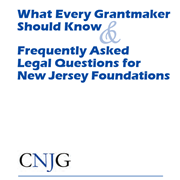
This guide was designed to help the state’s philanthropic community understand their ethical, legal, and fiduciary requirements and obligations.
Joint Statement from CNJG and the Center for Non-Profits
This statement also appeared on NJ Spotlight.
A conversation between two customers in line at a New Jersey supermarket turned ugly when one man denigrated the other with a racial slur and blamed the fellow shopper for the coronavirus pandemic.
With so much else going on these days, it would be so easy to react to such a seemingly minor incident by saying, oh well, these things happen. Times are tough; tempers are short.
But shrugging our shoulders is not an option. Doing so is complicity in a wrongful acts that too often are repeated, over and over. Our silence merely emboldens those who would tear apart the fabric of our society, whether through hate or ignorance – or the extremely volatile mix of the two.
It’s not difficult to connect the dots between “little” incidents and the systemic racism that leads to tragedies like the killing of George Floyd in Minneapolis. When we ignore or accept any examples of people being demeaned over what they look like or where they (or their ancestors) came from, we only open the door for massive abuses and the wrenching reckoning that follows them.
We mustn’t be cowed by fear of being seen as overly sensitive or labeled “politically correct.” This is about being morally and ethically correct in the face of bias and hatred – and that shouldn’t be too much to ask of Americans, regardless of their political party or ideology.
As state Attorney General Gurbir Grewal said recently, “COVID-19 is no excuse for racism, xenophobia, or hate. Discrimination and harassment in violation of New Jersey law remains illegal even if it occurs against the backdrop of a global pandemic." It’s gratifying to live in a state where the top law enforcement officer speaks out this way.
Unfortunately, it also is a state where reported hate crimes are up in recent years. We can’t tolerate such behavior, whether by police, elected officials or “average people.” There is too much at stake for bias to become the new normal.
As the leaders of the major philanthropic and non-profit membership organizations in New Jersey, representing both the wide range of non-profit groups and the multi-faceted funders of those groups, we feel compelled to speak out against the hateful responses we and our members have witnessed in reaction to the COVID-19 Pandemic.
Our country has seen countless examples of selfless sacrifice and good works over the past weeks, both on individual and institutional levels. We are proud that the members our organizations have been leaders in responding to the needs of our community.
But to our distress, some individuals are using the pandemic to put forward their bias and hatred toward their fellow citizens.
Times of crisis bring to the surface, on the part of some people, the need to scapegoat. Often, this takes the form of lashing out at particular groups, stirred up by inflamed rhetoric or more subtle code words or phrases, having no relationship to facts. In this time, there have been verbal and physical attacks against people of Asian and Pacific Islander background, as there were against Muslims after September 11 and against African-Americans and Latinos in countless other instances. This hatred and these attacks must stop.
The non-profit sector is the backbone of our communities, providing assistance and education to a wide range of people, in good times and especially in challenging times. Many of these services are a lifeline to people of all backgrounds, religions, ethnicities and statuses in life.
Non-profit organizations are the vehicle through which people can work together to selflessly assist others. People around the world view the United States as being unique in the breadth and depth of its charitable and philanthropic work, engaging the talents of all individuals, regardless of their economic or social status.
We call upon all people of good conscience in their good work to be alert for hateful words and actions and – always -- to speak out against them, both as individuals and as organizations.
Our language and our actions do matter.
Everyone, and especially people in positions of public trust or prominence, has the obligation to use our works and our lives to assist all in need and to honor the dignity and potential of all those we meet.
We call on not only our own members, but everyone who serves and volunteers in our sector to join us in this effort to speak out against racism and hatred and to exemplify all the best that we know our country is.
Maria Vizcarrondo
CNJG CEO and President
Linda Czipo
Center for Non-Profits CEO and President
William V. Engel
CNJG Board Chair
Gina M. Plotino
Center for Non-Profits Board Chair
We are pleased to share Strengthening Philanthropy in Newark - Report to the Field 2015 from the Office of the Newark Philanthropic Liaison. First established in 2007, the Liaison office represents one of the nation’s first formal partnerships between a city and the philanthropic community. The initiative began as a partnership between the Council of New Jersey Grantmakers in collaboration with then Mayor Cory A. Booker. We are proud this unique partnership continues with Mayor Ras Baraka and his new administration.
This report provides a brief summary of some of the substantial activities and impact the Office of the Newark Philanthropic Liaison facilitated throughout 2015. The strategy of collective impact is thriving throughout Newark thanks in large part to the work of the Liaison, and the funding community’s support of and robust engagement with the Office of the Mayor and anchor institutions across the city continue to reap positive outcomes. The Office of the Newark Philanthropic Liaison is supported by: Bank of America, The Foundation for Newark’s Future, Geraldine R. Dodge Foundation, The MCJ Amelior Foundation, The Nicholson Foundation, Panasonic Corporation of North America, The Prudential Foundation, Schumann Foundation for New Jersey, Turrell Fund, Victoria Foundation, and PSEG Foundation providing in-kind support and meeting space.
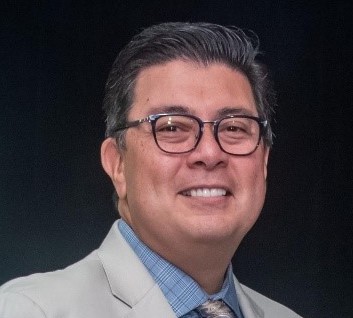
New Jersey’s philanthropic community mourns the loss of Jeffery Vega, who passed away January 28.
Jeff joined CNJG’s Board in 2016, and during his tenure served as First Vice Chair and Board Chair, and participated on multiple committees, affinity groups, and co-chaired the Trenton Area and Mercer County Funders affinity group. Jeff shaped and cultivated the direction and focus of CNJG through his supportive and proactive leadership. His direction and guidance during the pandemic helped CNJG not only stay the course, but continue to grow and thrive.
“Working with Jeff was a joy and a privilege,” CNJG President and CEO Theresa Jacks said. “Jeff guided us through the pandemic, a leadership transition, a strategic planning process, the approval of equity principles, and CNJG’s first-ever policy agenda with a steady hand, fierce commitment to equity, unwavering dedication to the membership, and the perfect combination of visionary thinking, wisdom, and kindness.”
His CNJG legacy includes the 2023 Strategic Plan, the creation of the Racial Equity Committee, CNJG’s first policy agenda, the New Jersey Principles for Philanthropy, and leading a dynamic and diverse board.
Jeff was the President and CEO of Princeton Area Community Foundation since 2015. Before joining PACF, Jeff was President of New Brunswick Tomorrow.
You can read more at the Princeton Area Community Foundation’s tribute page and announcement of Jeff’s passing.
This advocacy and civic engagement toolkit is designed for community and public foundations that want to educate and encourage their grantees about getting involved in civic and policy activities to increase organizational capacity and impact. While its primary focus is on the grantmaking activity of these foundations, the toolkit also addresses rules and guidance for policy involvement by foundation officials acting on behalf of their foundations.

